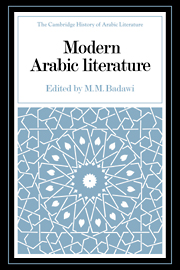Book contents
- Frontmatter
- Contents
- Editorial Note
- Chronological table of events
- Map of the Arab World
- 1 Introduction
- 2 The Neo-classical Arabic poets
- 3 The Romantic poets
- 4 Modernist poetry in Arabic
- 5 The beginnings of the Arabic novel
- 6 The mature Arabic novel outside Egypt
- 7 The Egyptian novel from Zaynab to 1980
- 8 The modern Arabic short story
- 9 Arabic drama: early developments
- 10 Arabic drama since the thirties
- 11 The prose stylists
- 12 The critics
- 13 Arab women writers
- 14 Poetry in the vernacular
- Bibliography
- Index
6 - The mature Arabic novel outside Egypt
Published online by Cambridge University Press: 28 May 2012
- Frontmatter
- Contents
- Editorial Note
- Chronological table of events
- Map of the Arab World
- 1 Introduction
- 2 The Neo-classical Arabic poets
- 3 The Romantic poets
- 4 Modernist poetry in Arabic
- 5 The beginnings of the Arabic novel
- 6 The mature Arabic novel outside Egypt
- 7 The Egyptian novel from Zaynab to 1980
- 8 The modern Arabic short story
- 9 Arabic drama: early developments
- 10 Arabic drama since the thirties
- 11 The prose stylists
- 12 The critics
- 13 Arab women writers
- 14 Poetry in the vernacular
- Bibliography
- Index
Summary
THE EMERGENCE OF THE NOVEL: POLITICAL AND SOCIAL CONCERNS
My survey of the earliest stages in the development of the modern Arabic novel in the preceding chapter concluded with a brief discussion of Muḥammad Ḥusayn Haykal's novel, Zaynab. While this novel was much concerned, like many other examples of its own and earlier times, with romance, Haykal placed a set of Egyptian characters firmly into the present and proceeded to use them in a discussion of a societal problem which was of great interest to himself and to many other Egyptian intellectuals, namely the role of women in society. In the decades that have followed the publication of Zaynab, at the hands of some writers the novel continues its functions as both entertainer and educator. Novels of romance, designed to divert, continue to appear and have more recently provided ready material for both television and film. The tradition of the historical novel has also continued, particularly under the impetus of a growing sense of national pride fostered by Arab Nationalism but, in more recent times, the attention of novelists has tended to be more devoted to the events of the recent past and the lessons to be gleaned from them.
- Type
- Chapter
- Information
- Modern Arabic Literature , pp. 193 - 222Publisher: Cambridge University PressPrint publication year: 1993
- 2
- Cited by

